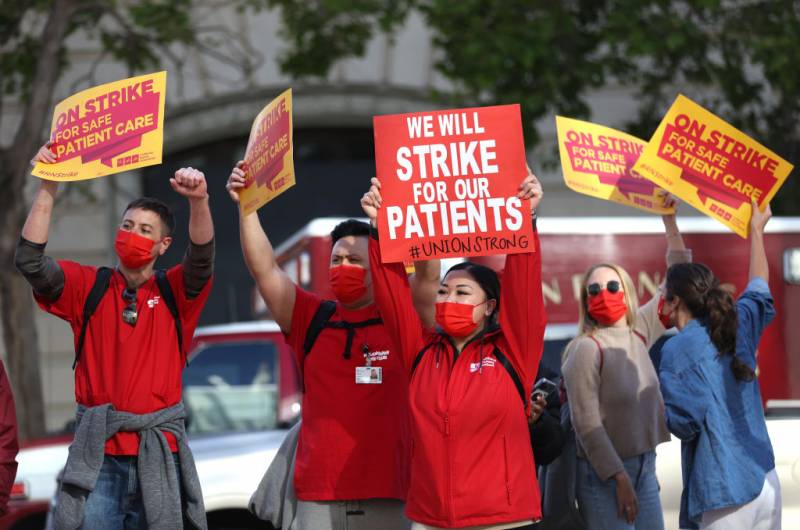Along that vein, we have been hearing about a California nursing shortage. A 2021 CalMatters story said that the understaffing was at a "crisis point," and that was a year ago. Can you talk to me about some of the driving factors behind this issue?
We did a survey in late 2020, and what we found at that point is a lot of nurses that were close to retirement already left. I think there were a lot of nurses within a year or two of retirement who looked at the situation and said, "I'm older, I'm at higher risk, I don't want to work in these circumstances," and they left the workforce. So that left hospitals already with short-staffing issues.
And then when we had the more contagious variants, we had a lot of concerns about nurses going out on basically quarantines. And that left the nurses who were not on quarantine with even fewer nurses to help out with the work. In the long term, two years of working through pandemic conditions and all of the death and the stress and, in some cases, hostile patients and families and other experiences that nurses have had, a lot of them are saying, "We need to be better compensated and have better protections in our work environments to feel like we want to stay in these jobs."
The analysis that we did based on that 2020 data suggested that we may have a pretty significant shortage for the next five or six years, but we're waiting for newly graduated nurses to come online and take up the jobs that have been so rapidly vacated. And that was more than a year ago that we did that analysis. So we don't know yet if things have gotten worse or, perhaps, as things are beginning to settle down with the pandemic, maybe things are going to start looking a little bit better. Hopefully, we'll be able to get some data to learn more about that over the next six or nine months or so.
These two groups, these two unions of nurses that are either striking or considering striking very soon, one of their big concerns is access to PPE, other protective equipment. Tell me, what is the issue with that at this point in the pandemic?
Well, fortunately, a lot of those concerns did calm down after the first six or nine months or so when PPE was so impossible to get ahold of. That said, these kinds of concerns can continue to exist. And I think for a lot of health care workers, they may have concerns about relaxing some of the restrictions that may bring family members in who aren't required to have equipment. And if that's happening, then the nursing staff and the other health professionals may feel like they want more protection because the people around them may be less protected. I think that is going to be an ongoing concern, especially about the quality of the equipment and its availability and trying to move into a more sustainable pattern of of use.
Depending on the situation, the strikes coming up are generally registered nurses and generally in hospitals. But there are other settings like nursing homes that have been hit really hard, and there was a long period of time where family members were really not allowed to go into nursing homes. What people haven't really talked about for nurses and nursing assistants in those settings is how much extra workload that put on those staff. Often, family members go in and help take a meal with a loved one and help feed them and help provide other services or other support to their family member, which relieve some of the workload and the burden for the paid staff in a nursing home setting. When the family members were kicked out, the nursing staff had all that extra work that they needed to do, and there was no emotional support for the family members beyond the staff, so it's incredibly burdensome. So I think that's another area where we don't see any strikes coming up in the next week or two, but I think we really need to keep a close eye on what's going to happen in nursing homes next.
Let's talk about the responses from hospital administrators. Stanford Health Care has doubled down on their plan to cut off health insurance coverage for the nurses if they go through with the strike next week. Of course, there's been a big backlash to that decision. Have you seen any responses from hospitals or hospital systems that have worked at improving conditions for nurses?
I think a lot of those systems are trying to make various improvements, although it's not always advertised what improvements that they're making until there are allegations about problems. I'm at University of California, San Francisco, and so of course, I may be somewhat biased, but I know that our leadership has been putting a lot of work into trying to have adequate staffing and trying to promote a really highly respectful culture and make sure that staff understand how appreciated they are. But I can't entirely speak to the responses in the other organizations cutting off health benefits. First, there may be some practical and legal issues about trying to do that with any rapidity. But the last time Stanford had a big strike, that strike went on for more than a year. So they and the administration there may be really wanting to come down hard in trying to deter a strike because the last one was so drawn out and so painful for them.
KQED's Natalia Navarro, Sara Hossaini and Mary Franklin Harvin contributed reporting to this story.

